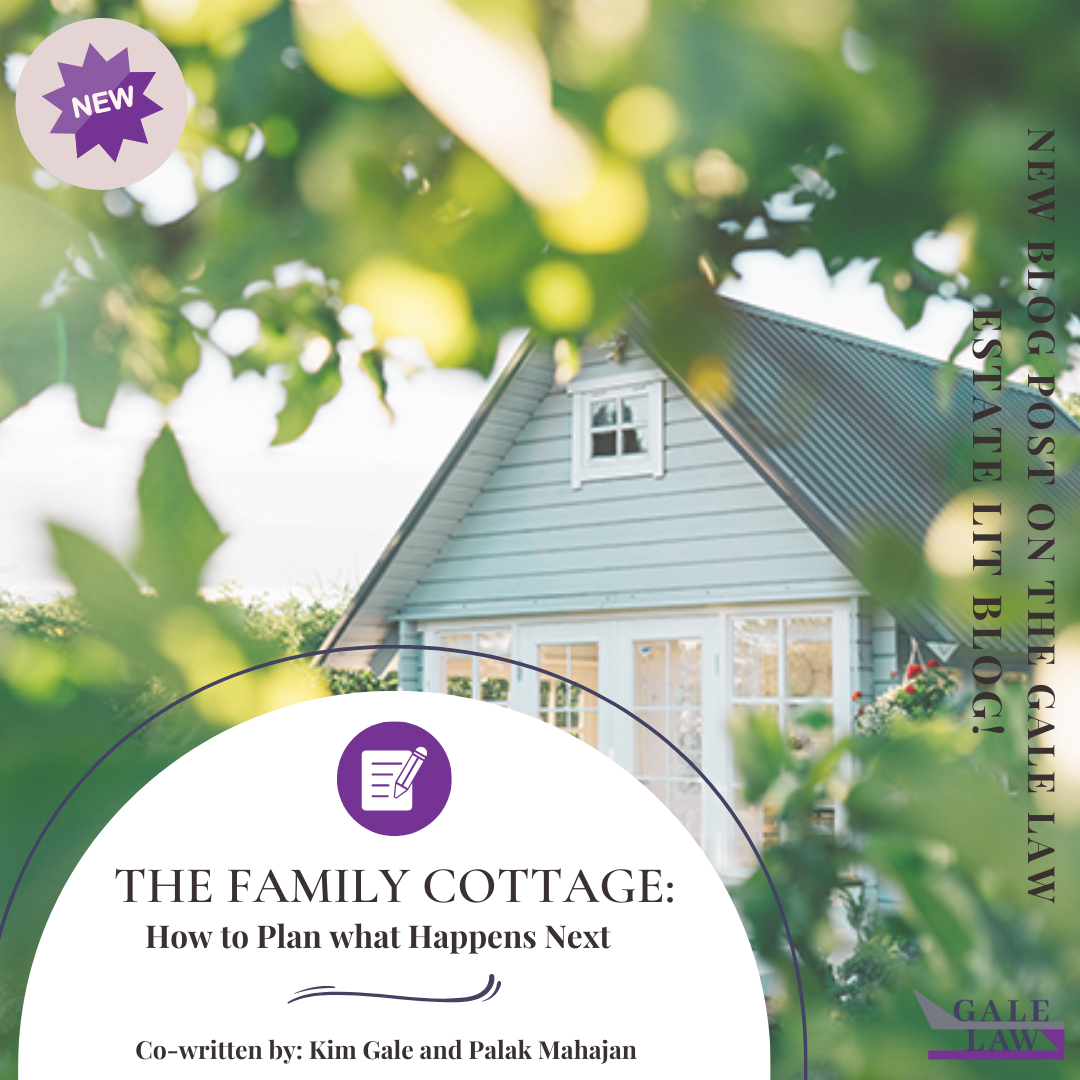Co-written by: Kim Gale and Palak Mahajan
The Family Cottage: How to Plan What Happens Next
For many families, a summer cottage has been their getaway home. It's their break from the hustle and bustle of their lives and a breather from the mundane that life tends to be. It also becomes the place where families unite for vacations or breaks and therefore, holds immense emotional value.
The estate trustee must follow the terms of the will, or if no will, the laws of intestacy and have the legal and fiduciary duty to act in the best interest of the estate and maximize its value. Trustees must follow the terms of the trust. Family members usually have different ideas on how to utilize the property upon the owner's death. Sometimes the cottage must sell.
When planning for their estate, owners of the cottage may wish to consider some of the following estate planning options.
Cottage trust
Cottage owners may wish to consider setting up a cottage trust in their will or by an inter vivas trust (a trust set up while they are living).
The cottage trust set up in their will may state that the cottage will be held for the benefit of their children and grandchildren and cannot be sold for a certain period. The will may stipulate that at the end of the period of time, any of the remaining beneficiaries would be able to purchase the cottage with the remaining beneficiaries receiving the sale proceeds (ie. a buy-back mechanism).
If set up via an inter vivas trust, the trust instrument can appoint a trustee and transfer the cottage to the trustees. The trustees would hold the cottage in trust pursuant to the terms of the trust.
This is one way of avoiding conflicts amongst the parties as it allows the children to use the cottage for a certain period of time. However, trusts must be managed by a trustee (and their fees for managing the trust) and don't forget the rule in Saunders v. Vautier [1841] C.C.S. NO. 14 which says that if all the beneficiaries of a trust are of the age of majority and sound mind (ie. sui juris) the trust may be terminated if all the beneficiaries wish for this to happen. We note that this rule stemming from the English case has become more complicated. Overall, the testator must use caution when considering setting up a cottage trust as it may have unintended consequences.
Right of first refusal
This clause can be used in a will or trust instrument to give an individual the option to purchase specific property from an estate or trust. It is most common for real estate, such as a cottage. This provides the testator with an opportunity to set up a mechanism for handling the distribution of the cottage by giving one child the first right of first refusal to buy the cottage.
Capital gains tax
It is likely that the cottage will not be considered the principal residence of the deceased. A cottage is considered a capital asset when it comes to taxation. Therefore, during the estate planning, the owner ought to consider the implications and applicability of the capital gains tax upon the transfer of the cottage to the proposed titleholder. If the cottage is held in joint tenancy, it passes through right of survivorship to the surviving spouse and there are no tax implications. However, on the death of the surviving spouse, the cottage must be first transferred to the estate. The estate trustee administers the cottage pursuant to the terms of the will, or if no will, the laws of intestacy.
Disposition of the cottage (transferring title from the estate to someone else), if it is not the deceased's principal residence, would trigger capital gains tax. Half of the cottage capital gain would be taxable on the increase in value from when it was purchased to when it is sold to someone else.
Probate fee and property tax
Like the capital gains tax, a probate fee (and some other property taxes) may be applicable. Real estate in Ontario is an asset subject to probate tax (which is 1.5 per cent of value of estate over $50,000). To avoid probate tax, families may wish to add their adult child as a joint tenant, but you must be cautious when doing this as there is a risk of the child taking the position that they own the cottage outright as it is an asset that passes outside the estate. However, there is a presumption that the child is holding it on a resulting trust for the benefit of the estate (see Pecore v. Pecore, 2007 sec 17. Also, see our articles: What is estate administration tax, parts one, and two for more information on probate tax, particularly part two which discusses joint ownership).
The cottage is a meaningful asset that forms part of the estate and there are many considerations for the testator who is planning their estate as well as to the beneficiaries inheriting the cottage. A recent issue of Maclean's dubbed Ontario's Muskoka region as "The Olde Faithful," estimating the average recreational property price in 2022 to be $842,000! Careful consideration must be made when dealing with the cottage.
This article was originally published by Law360 Canada part of LexisNexis Canada Inc.

